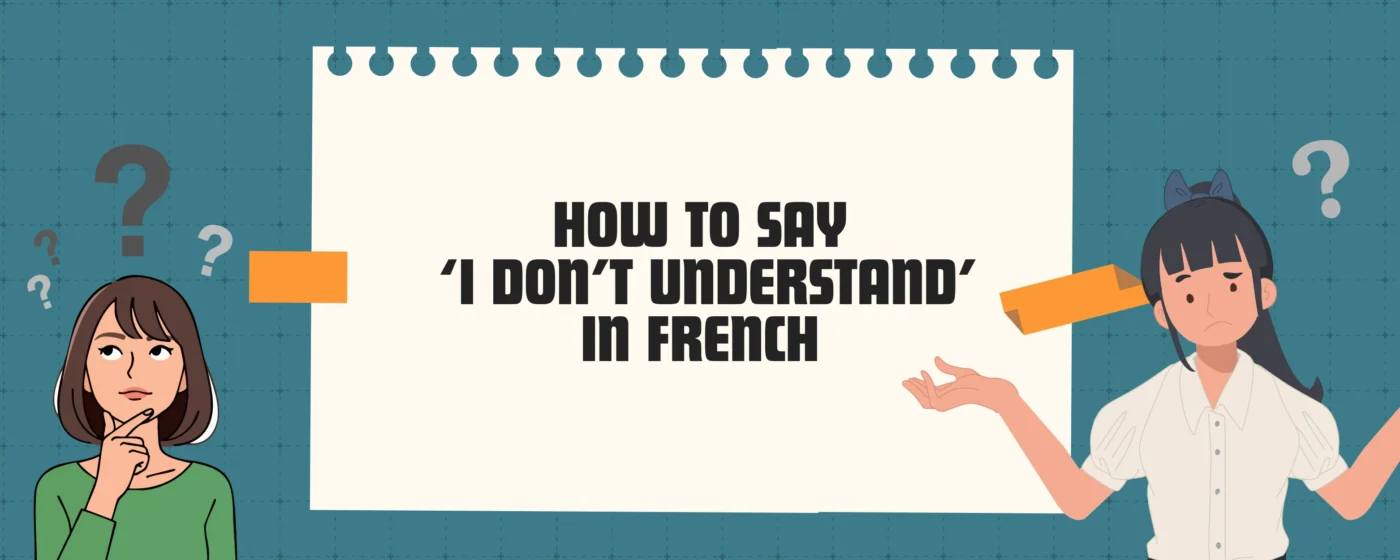How to Say Sorry in French: Your Guide to Perfect Apologies

While talking to a professor or shopkeeper, you casually use “tu” instead of the more formal version of “vous”. The sudden glance catches you off-guard. That will make you realize learning “how to sorry” en français is essential. Whether you’re roaming in the streets or chatting with locals an apology will save you from faux pas. Apologizing in French is more about understanding and respecting cultural nuances and helps to make encounters smoother rather than embarrassing and awkward ones.
Key Takeaways
- Learn different ways to say Sorry in the French language, and also learn how to respond to an apology sentence or words.
- Use different words to express your apology, such as « pardon » or « excusez-moi » for quick everyday moments, bumping someone, interrupting, or getting attention, without sounding too dramatic.
- You must know that the deeper or more formal apologies, phrases such as « je suis navré(e) », « toutes mes excuses », « mille excuses » or « veuillez m’excuser » sound more sincere and respectful.
- Know the words where you take care with « je m’excuse » because it literally means “I excuse myself” and can feel a bit off or less polite depending on tone and context.
- Know and understand when someone apologises to you, replying with « ce n’est pas grave », « pas de soucis » or « ça va » reassures them it’s okay and keeps the interaction friendly.
Common Ways to Say “Sorry” in French
1. Désolé(e) : Most common and versatile apology
Meaning: Sorry
Context: Both formal and informal
Désolé (masculine) and Désolée (feminine)
The word désolé is used to express regret and sadness, and it changes form for gender and number: ‘je suis désolé(e)’ for a single person and ‘nous sommes désolés’ for multiple people. It is the most widely used apology and works in both personal and professional settings, from friend to boss. You can use it to express anything from minor inconveniences to serious errors. The whole phrase ‘je suis désolé(e)’ is commonly used, and ‘je suis très désolé’ is generally not standard. “Je suis” is used for more formal conversations and expresses deep regret. The word désolé is also used to express sadness in certain contexts.
Here are some examples:
- Je suis désolé, je ne suis pas libre le Samedi (I am sorry, I am not free on saturday)
- Je suis désolé de t’avoir blessé (I am sorry for hurting you)
- Nous sommes désolés pour le retard (We are sorry for the delay) for multiple people
2. Pardon : Quick apology
Meaning: Pardon
Context: Casually
You can use Pardon for various instances in daily life. It is often used as a stand alone word in public transport or crowded places, and is an informal way to apologize. You might use it when you step into someone’s foot, bump into someone in the railway station, or ask someone to repeat themselves. It’s used as a light, social apology during casual encounters. The phrase is often used in public transport.
Some examples are:
- Pardon, qu’as-tu dit (Sorry, what did you say?)
- Pardon ! (used as a stand alone word when moving through a crowd or on public transport)
3. Excusez-moi : Polite and Formal Apology
Meaning: Excuse me.
Context: Both Formal and Semi-formal
People usually use Excusez-moi to politely get someone’s attention (like a shopkeeper), but it’s also a great way to apologize in slightly formal contexts when you are interrupting someone or starting a conversation. ‘Excusez-moi’ is the formal way, while ‘Excuse-moi’ is the tu form and is used informally.
Here are some examples:
- Excusez-moi, qui êtes-vous? (excuse me, who are you?)
- Excusez-moi, quel est votre nom? (excuse me, what’s your name)
4. Je suis sincèrement désolé : For Heartfelt and Serious Mistakes.
Meaning: I am sincerely sorry
Context: Formal, written, or emotional situations
This phrase expresses a more serious or heartfelt mistake and conveys deep regret rather than simply saying sorry. It is a formal way to express regret and sadness, and is one of several formal ways to say ‘I’m sorry’ in French. It is ideal for serious situations, written apologies or emotional contexts.
Here are some examples:
- Je suis sincèrement désolé. Je ne pourrai pas venir aujourd’hui.(I’m sorry. I won’t be able to come today.)
- Je suis sincèrement désolé(e), je ne pourrai pas payer aujourd’hui. (I am sorry, I won’t be able to pay today)
5. Je suis navré : : For Expressing your Grief or Serious Mistakes
Meaning: I am deeply sorry
Context: Formal, emotional, or serious apologies
Je suis navré is used to express sadness and is a formal way to apologize, often used in serious situations. This is a more formal phrase that often carries a tone of empathy and is used while delivering bad news and expressing sympathy.
Here is an example:
- Je suis navré pour votre perte. (I am deeply sorry for your loss).
Note on ‘Je m’excuse’:
‘Je m’excuse’ literally translates to ‘I excuse myself.’ The literal translation can be perceived differently in French culture, and ‘je m’excuse literally means’ ‘I excuse myself.’ This phrase means something slightly different than ‘je suis désolé’ and can sometimes be considered less polite or even rude depending on the context. It’s important to understand the nuance when choosing how to express regret or apologize in French.
Expand your French greetings with 13 Ways to Say “Welcome in French” and make your conversations sound more natural.
Lost for Words? We’ve Got You!
Sign up for our courses and let our expert teachers boost your vocabulary effortlessly!
More French Words to Apologize
1. Toutes mes excuses : (My deepest apologies)
Use: Neutral to Formal
Context: written or spoken apologies
This phrase expresses deep regret and is usually used for both formal and semi formal settings. It can work for both written, emails, letter or spoken apologies for expressing your apologies.
Here are the examples:
- Toutes mes excuses pour ne pas avoir pu venir à l’anniversaire de votre fille. (My deepest apologies for not being able to come to your daughter’s birthday.)
- Je suis vraiment désolé(e) pour mes paroles. (I am truly sorry for my words.)
- Je ne voulais pas te blesser, toutes mes excuses. (I did not mean to hurt you, my deepest apologies.)
2. Je te demande pardon : (I ask for your forgiveness)
Use: Informal(tu) / formal (vous)
Context: Emotional or sincere apology
This expression expresses sincere regret when you seek forgiveness. It can be used in both formal and informal situations. The emotions are stronger than just simply saying “désolé”.
Example: Je suis sincèrement désolé pour mes actes et je te demande pardon. (I am sincerely sorry for my actions and I ask for your forgiveness.)
3. Veuillez m’excuser : (Please excuse me)
Use: Very Formal
Context: Professional situation
Veuillez m’excuser is used in formal situations like public speaking, business meetings, presentations or formal emails. It demonstrates your respect and courtesy, especially towards someone in higher authority and good social behavior.
Example: Veuillez m’excuser pour mon absence à la réunion. (Please excuse me for my absence at the meeting.)
4. Désolé pour le dérangement : (Sorry for the inconvenience)
Use: Neutral
Context: Day-to-day situations
This is used when you’ve caused a minor inconvenience or trouble to someone. This can be used in schools, shops, meetings etc. It also shows sincerity and politeness.
In very formal contexts, you may see: Veuillez nous excuser pour la gêne occasionnée, which is a polite way to apologize for any inconvenience caused.
Example: Désolé pour le dérangement, nous travaillons pour résoudre le problème. (Sorry for the inconvenience, we are working to resolve the problem.)
5. Mille excuses : (A thousand apologies)
Use: Neutral
Context: Causal or semi-formal situations.
Using this expression intensifies your apology. It shows sincere regret. People use it both humorously among friends and seriously.
Example: Mille excuses pour mes erreurs (A thousand apologies for my mistakes.)
Responding to Apologies in French
Just as important as knowing how to apologize is knowing how to respond when someone says sorry in French. When a French person offers an apology, it’s customary to acknowledge it graciously. The most common way is to say “ce n’est pas grave” or the more casual “c’est pas grave,” both meaning “it’s not a big deal.” This reassures the other person that you’re not upset and helps maintain a positive atmosphere.
In more formal situations, you might hear or use “je vous demande pardon” or “je te demande pardon” to express that you accept the apology or to reciprocate the sentiment. For especially formal occasions, such as in business or with someone you don’t know well, “je vous prie de bien vouloir m’excuser” is a very polite way to respond, showing that you appreciate the apology and are willing to move forward. Understanding these responses helps you navigate French social interactions smoothly and shows that you respect the cultural importance of apologies—whether it’s a big deal or just a minor slip.
Learning these French phrases helps you connect authentically with native speakers, navigate social situations with ease, and boost cultural confidence. Keep expanding your vocabulary to speak naturally and confidently. Ready to take your French to the next level? Discover expert-guided courses and immersive learning experiences at La Forêt French Class.
Enhance your French vocabulary by learning polite expressions from the blog Top 10 Ways to Say “Thank You” in French for everyday conversations.
How to Say Sorry in French: Why It Matters?
In francophone countries, apologies hold cultural significance rather than a simple expression of regret. You better show respect, humility, and kindness while being genuinely sorry. French people believe in politeness, and knowing the correct form of apology shows your cultural understanding and language skills. Your timing of pardon or désolé(e) can smooth over misjudgment, else you may come across as a rude or insensitive person.
French people use tu for informal and vous for formal settings like Je vous demande pardon for formal conversations while apologizing to an elder or someone of higher authority. Using excusez-moi or désolé works well informally among friends or peers. Mistaking with tu or vous might lead you to unexpected trouble or awkwardness. Everyone makes mistakes when learning French, especially English speakers, and understanding these nuances is important for native English speakers.
Knowing the correct way to apologize in French shows your respect towards their culture and strengthens your ability to build new connections rather than making cultural blunders. Learning French involves understanding these cultural differences.
Improve your pronunciation by exploring 13 Hard French Words to Pronounce and understand how native speakers articulate tricky sounds accurately.
Frequently Asked Questions
1. How do you apologize in France?
Ans: In France, the most common way to apologize is by saying “Pardon” or “Je suis désolé(e)” depending on the context. Pardon is used for minor incidents, while Je suis désolé(e) expresses sincere regret.
2. How to say sorry in a cute way in French?
Ans: For a softer, playful tone, you can say “Désolé(e), petit(e)!” or “Oups, pardon!” with a smile. Tone and body language matter a lot in French culture.




